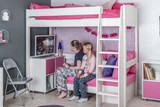3 Steps to Creating a Safe Learning Environment for Children
With school back in full swing, many of us are still getting to grips with setting up a happy and healthy homework routine for our little ones. Even if you don’t have children of school age, making sure a children’s learning environment at home is safe and comfortable is still really important to support little minds that are learning all the time. Whether it’s a dedicated study area for doing homework or a quiet place for new readers, here’s how to create a safe children’s learning environment.
1. Celebrate Differences
The first thing to acknowledge is that every child learns differently. Some children might love doing their homework in the hubbub of the family kitchen where there’s always someone to ask for help, others might prefer a quiet space away from everyone where they can concentrate. Some children might like to read about a topic, others might benefit more from you talking them through it or allowing them some hands-on learning time. Take some time to find out where and how your little one most likes to learn so you can choose the best desk or reading den to suit them.
2. Celebrate Questions
As well as the physical environment, the environment you create for your child via your own attitude to learning can be crucial. Children tend to learn by example so, if you show that you’re stressed out or frustrated with things you don’t understand or tasks you don’t want to do, it’s likely that they’ll copy your behaviour. Try to be patient and kind when helping your children to learn and remember to never laugh at or make fun of any questions they ask – even if they might seem obvious to you. A child that is asking questions is engaged and interested and this isn’t something you ever want to discourage by being impatient.
3. Celebrate Success
Children tend to learn best when they feel pride in what
they’re doing or in the new knowledge they’ve gained. Telling children off for
making errors or pointing out the things they’ve done wrong creates a negative
environment around learning where children don’t feel safe to make mistakes and
can end up resenting teaching and study time. Instead, celebrate your child’s
learning successes, no matter how small. The pride they feel will help them to
create positive associations with learning that should make their school lives
much more interesting and rewarding in the future.
Recent Posts
-
Unlocking the Potential of High Sleeper Beds for Teenagers
As teenagers go through all the ups and downs of being a teen, their likes and dislikes change a lot
-
Choosing Between a High Sleeper Bed vs. Mid Sleeper Bed
As your little one grows, so do their needs, and finding the perfect kids’ bed for them becomes









